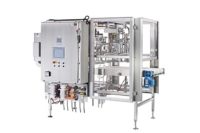Several large food processors joined together to launch FReSH (Food Reform for Sustainability and Health), a program under the leadership of the World Business Council for Sustainable Development (WBCSD), Geneva, and the EAT Foundation (EAT), Oslo, Norway.
FReSH is designed to accelerate transformational change in global food systems and reach healthy, enjoyable diets that are produced responsibly within planetary boundaries.
To achieve this goal, FReSH draws on knowledge and efforts from premier research institutions to develop high-impact solutions. Industry leaders participating include Kellogg Co., Battle Creek, Mich.; Nestlé USA, Glendale, Calif.; Arla Foods USA, Basking Ridge, N.J.; Danone, France; and Unilever, Englewood Cliffs, N.J., among others.
The FReSH program creates the “conference of parties” for food to accelerate the transformation toward a healthy and sustainable global food system.
“What we eat and how we produce it drives some of our greatest health and environmental challenges. On the other hand, getting it right on food is our greatest opportunity to improve the health of people and planet. This will require concerted action across disciplines and sectors, and business will be a key part of the solution,” says Gunhild Stordalen, founder and president, EAT Foundation.
Why FReSH?
FReSH is a platform for the private sector to achieve the food supply transformation in a safe and pre-competitive space. In cooperation with science, academia, policy-makers and civil society, FReSH will catalyze change across the food systems, taking into account local eating patterns, by focusing on the following work streams:
- Develop guidelines on healthy and sustainable diets, taking into account social and environmental considerations;
- Food production adjustment, including formulation and offering to help achieve healthy and sustainable diets;
- Food consumption reorientation to strengthen demand for healthy and sustainable diets;
- Improvement of food sourcing and reduction of food loss and waste;
- Measurement, reporting and communicating progress.
FReSH draws on the findings of the EAT-Lancet Commission on Healthy Diets, where a multi-disciplinary group of world-leading scientists synthesize existing evidence to establish targets for healthy and sustainable food systems.
“Clear science-based targets will help businesses create ambitious yet implementable solutions, which can then be brought forward to guide policy makers to provide the framework for local or global food systems transformation,” adds Peter Bakker, president and CEO, WBCSD.


